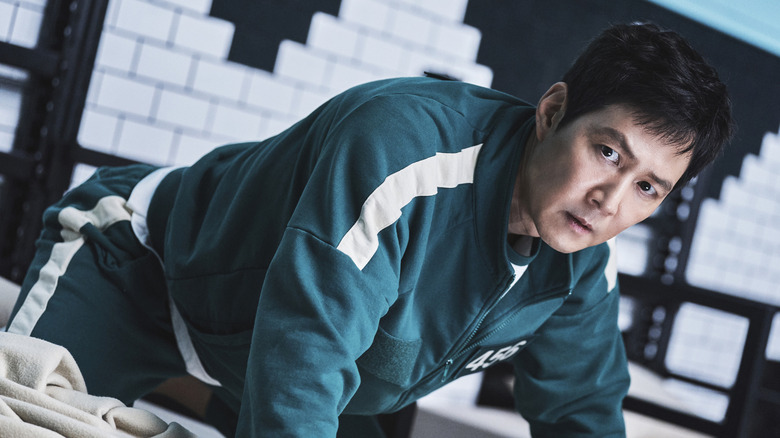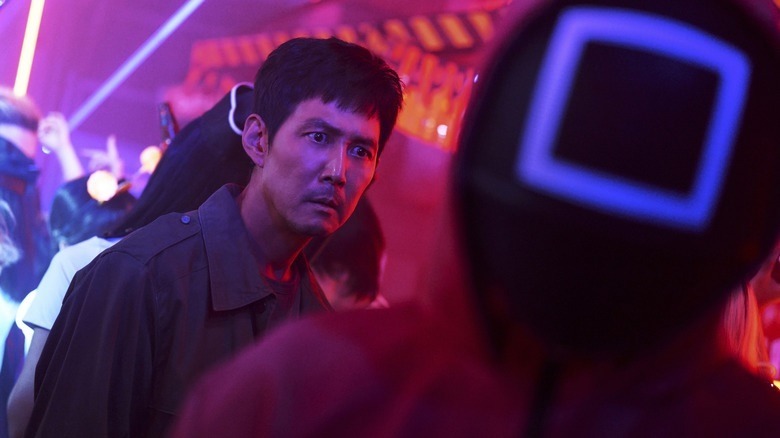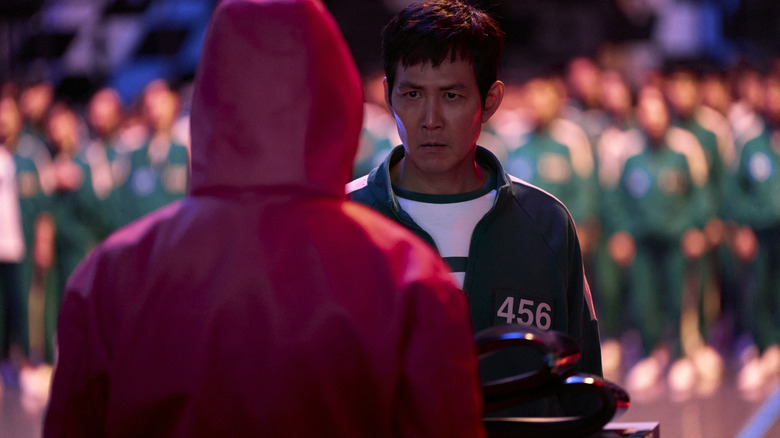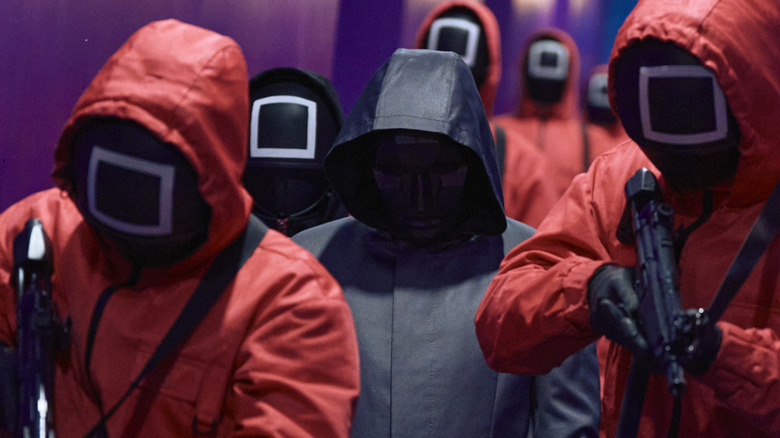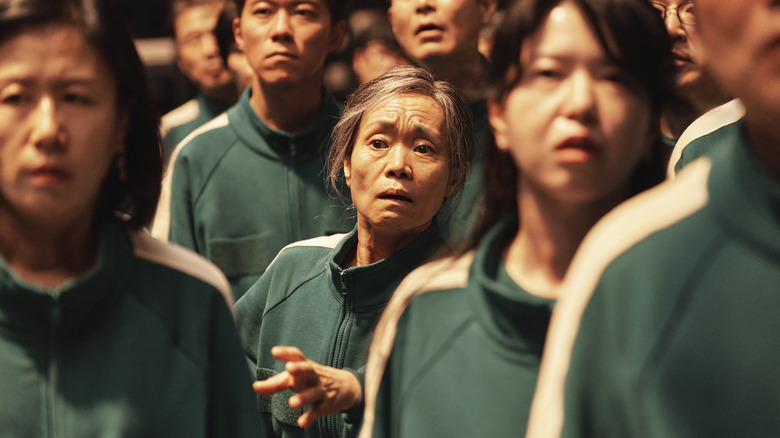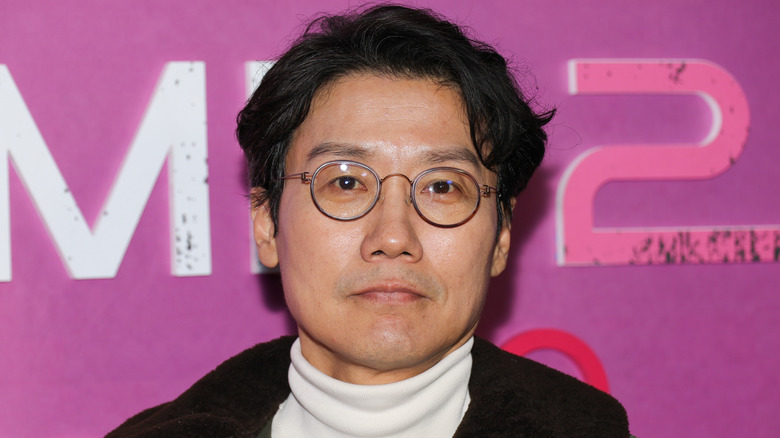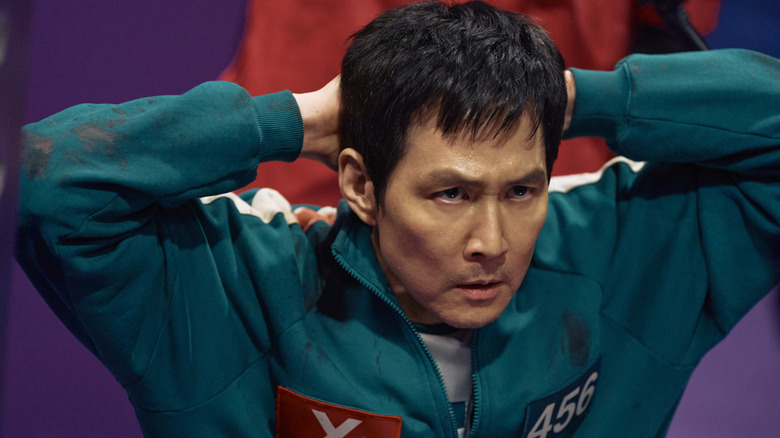The Ending Of Squid Game Season 2 Explained
Contains spoilers for "Squid Game" Season 2
"Squid Game" was originally intended to last just one season (and almost had a very different ending). Then it became the most popular show on Netflix — and creator Hwang Dong-hyuk needed the money Netflix wasn't giving him from the first season's success — so now "Squid Game" Season 2 has arrived three years after the death game K-drama first took the world by storm. Season 3, produced simultaneously with Season 2, will conclude the story sometime in 2025.
Unlike the ending of "Squid Game" Season 1, the "Squid Game" Season 2 finale doesn't feel like an ending at all so much as it feels like the darkest possible cliffhanger right in the middle of the story. Acknowledging that Season 3 might recontextualize a lot of what we've seen so far, let's examine what happened at the end of Season 2, what social commentary the show is making on the state of the world, and what absolutely needs to be addressed before the series finale.
What you need to remember about the plot of Squid Game Season 2
Three years after winning the games, Seong Gi-hun (Lee Jung-jae) is set on destroying them once and for all. Teaming up with detective Hwang Jun-ho (Wi Ha-joon), who survived being shot by his brother the Front Man (Lee Byung-hun) last season and is now searching for the secret island where the games are held, Gi-hun tracks down the pink soldiers at a Halloween party and decides to join the games a second time. A tracker in Gi-hun's tooth is meant to help Jun-ho find him, but, alas, it gets taken from him, leaving the island discovery effort clueless.
In the games, Gi-hun tries to help everyone survive Red Light, Green Light, but a bee, ensuing panic, and the self-interested rapper Thanos (Choi Seung-hyun) cause 91 casualties. The survivors vote on whether to continue the games (unlike in Season 1, where ending the games meant forfeiting any prize, survivors must now vote on whether to split a smaller prize pool based on the body count thus far). The motion to end things after the first game loses by one vote, decided by Player 001, Young-il — who Gi-hun has no idea is actually the Front Man.
While Gi-hun knew what to expect from the first game, the second is a new one; a relay race where teams of five have to complete minigames. 255 players survive, and 139 vote to continue. The third game, Mingle, makes for one of the most brutal "Squid Game" scenes to date, cutting the survivors down to just 100. The vote to end or continue comes up a tie, necessitating another vote the next day. Thanos, who wants to continue, starts a bathroom brawl against those who voted to end the games, so Min-su (Lee David) stabs him in the neck with a fork.
What happened at the end of Squid Game Season 2?
The bathroom brawl — which continues into the start of the Season 2 finale — ultimately kills two X (end the game) voters and three O (continue the game) voters. Winning the next vote is now looking less about how many people on the other side you can convince and instead how many you can kill. Gi-hun, however, makes sure his fellow X voters don't attack the Os. Knowing the Os plan to attack them at curfew, he correctly expects the pink soldiers to arrive to break up the fight — and then his group can fight the pink soldiers, taking their guns and a hostage to guide them upstairs and end the games once and for all.
The pink soldiers, of course, are ready for this "special game," and while the players make a valiant effort in the ensuing firefight, they eventually run out of ammo. Dae-ho (Kang Ha-neul) is sent back to the living space to retrieve more, but his PTSD gets the better of him, and when Hyun-ju (Park Sung-hoon) goes to retrieve it herself, it's too little, too late — the rebellion has to surrender. Gi-hun, his old friend Jung-bae (Lee Seo-hwan), and Young-il make it into the pathway to the control room.
At this point, Young-il fakes his death, puts his Front Man mask back on, and shoots Jung-bae in the heart, daring Gi-hun to "look closely at the consequences of your little hero game." Pink soldiers confirm Jung-bae's death and restrain Gi-hun as he screams in agony, and that's where the season ends — with a mid-credits scene teasing the next game, involving boy and girl robots and a model train crossing (a new variation on Red Light, Green Light, perhaps?).
A story about democracy
The biggest difference in format and theme between "Squid Game" Season 1 and Season 2 is the new season's greater emphasis on voting. The campaigns between games to convince players to vote one way or another earn as much attention as the games themselves — and in the season finale, violence outweighs persuasion when it comes to taking power. It's not hard to see the real world relevance in this depiction of violent hyper-polarization; this season premieres just weeks after South Korean president Yoon Suk Yeol got impeached for attempting a military coup, and a month before the narrowly re-elected U.S. president Donald Trump reportedly plans to pardon the people who stormed the Capitol in 2021.
In the press notes for "Squid Game" Season 2, creator Hwang Dong-hyuk acknowledged how the show and its descent into violence during the finale reflect the global trend toward extreme political polarization. "We can see this kind of division not just in Korea, but all over the world — the growing conflict and hatred due to religion, ideology, background, gender, or race," he said. "I wanted to symbolically portray this in Season 2 by showing how players divide themselves into Team O and Team X, and how it leads them to stand against each other. There are just so many kinds of conflict we can't even name them all. Expressing hatred is so rampant."
Picking the right target
The ending of "Squid Game" Season 2 is all about Gi-hun's failed rebellion. Was it the right move? Would it have succeeded if the Front Man hadn't been acting as a double agent? Who knows. But the Front Man's infiltration shows two things: the powerful will always find ways to manipulate their opposition to stay in power — and Season 2 really just repeated the whole Player 001 twist from Season 1 (which is, admittedly, among the greatest TV plot twists of all time).
Gi-hun knows that all the X versus O fighting is "what they want" — the "they" in question being the people running the games. That Young-il (the X voter arguing strongest in favor of fighting the Os) is one of the game-runners just proves this point. Now, this doesn't mean the X and O sides should be deemed morally equivalent — after all, the O position is directly encouraging more death and serving the nefarious interests of the powers that be. But what the ending clearly demonstrates is that the ruling classes are adept at making those below them hate each other.
The question of human nature
On top of its political commentary, the thematic thrust of "Squid Game" continues to be a debate over human nature as a whole. Are people inherently selfish trash or are they capable of improvement? Those in charge of the games believe the former, while Gi-hun refuses to accept such extreme cynicism. By the end of Season 2, both sides of the argument have new examples they can point toward.
Jang Geum-ja (Kang Ae-shim) offers one of the clearer examples of a character actively improving — at the start of the games, the old woman is casually transphobic toward fellow player Hyun-ju, but by the season finale, Geum-ja's actively protective of Hyun-ju. On the other hand, the massacre of X voters by O voters is a clear-cut example of people sinking into violent selfishness. Then there are the more complicated situations which don't fit neatly into black-and-white morality.
Was Min-su switching to the O side in defiance of Thanos' peer pressure a sign of growth, or was killing Thanos, even in self-defense, a wrong move? Dae-ho might very well see his own failure to recover the ammo as "selfish," but it also feels wrong to judge him for his PTSD response. Gi-hun has to weigh up much sacrifice he can accept in enacting his rebellion — and the rebellion's failure results in even more sacrifice. How does one judge that when the credits are rolling? These philosophical conflicts are sure to keep brewing into the third and final season of "Squid Game."
What has the creator of Squid Game said about Season 2's ending?
If Jung-bae's death toward the end of "Squid Game" Season 2 left you reeling, rest assured that creator Hwang Dong-hyuk was anticipating your response. Speaking to Digital Spy, the showrunner said, "When [fans] watch the end of Season 2, they're going to be very upset with me because they're going to be like, 'How can you do this to us? We want Season 3 immediately.'" Since both seasons were made at the same time, viewers can at least take comfort in the fact that the wait for a conclusion won't be very long. Hwang described it as a "short break" that will give fans a chance to clear their heads ahead of Season 3, which is a direct continuation. In fact, Season 2 and Season 3 are two parts of a "single story," Hwang said, adding that Season 2 ends on an "inflection point that sort of catapults the story into a different direction."
It seems that Hwang Dong-hyuk's plan for how to end the series changed as a result of writing the second and third seasons simultaneously. Hwang told IndieWire, "Relatively speaking, the ending for Season 2 came to me quite early on. However, the ending to Season 3, actually ended up [in] a different direction than what I had initially conceived of. While I was working on the story and working on the script, I saw this new path that I wanted to go down, and so the ending of Season 3 actually changed in the process of creating Season 2." Gi-hun is already a very different character in Season 2 than he was in Season 1, and it sounds like the "turning point" of the Season 2 finale will change him even more.
What the end of Squid Game Season 2 means for Season 3
Most frustrations one might feel about the end of "Squid Game" Season 2 come from the fact it's much less an actual ending than the dramatic midpoint — and only for the main storyline at that. Season 2 has two ongoing subplots outside of Gi-hun's experience in the games, one following Jun-ho's search for the island, the other offering a humanizing look at one of the pink soldiers, a North Korean defector named No-eul (Park Gyu-young). Jun-ho's story gets only one scene early in the Season 2 finale, which reveals that Captain Park (Oh Dal-su) is violently sabotaging the mission, while No-eul disappears from the narrative after being called to the "special game."
Presumably, Season 3 will actually give those two hanging subplots something resembling a conclusion, as well as following through on all the intense drama Gi-hun is going through. What does participation in the games even look like after the failed rebellion? Is there any hope left of taking the whole system down? Hopefully the wait for Season 3 won't be too difficult. Beyond Season 3, Netflix is continuing to look at different "Squid Game" projects.
David Fincher, the director of many great movies, is considering an English language "Squid Game" series. Meanwhile, Hwang Dong-hyuk is developing a mockumentary about the overnight success of "Squid Game" titled "The Best Show on the Planet." And there's also going be another season of the "Squid Game: The Challenge" reality show — though given that "Squid Game: The Challenge" was reportedly rigged, we're not exactly looking forward to it.
